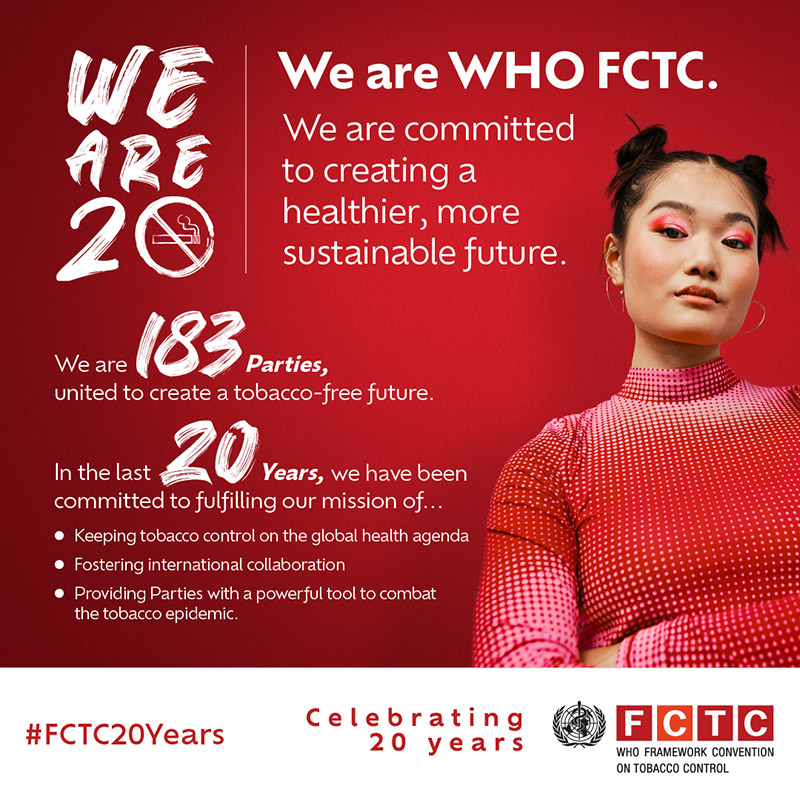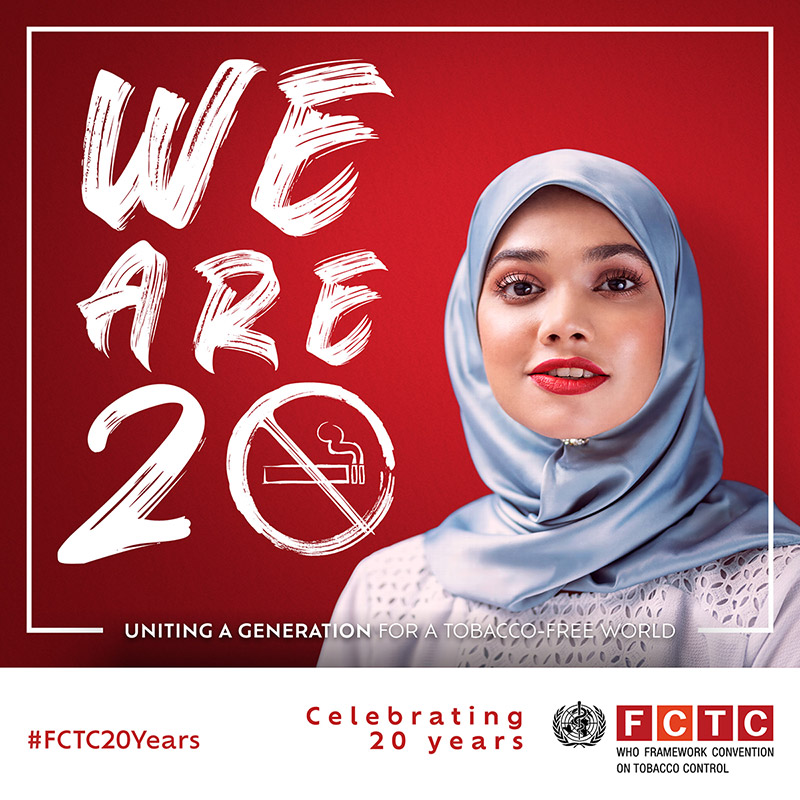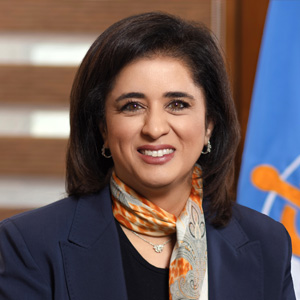
Geneva, Switzerland – 25 February 2025 – The WHO Framework Convention on Tobacco Control (WHO FCTC) – one of the most widely embraced UN treaties in history – celebrates the 20-year anniversary of its entry into force this week.
 The WHO FCTC is the first ever public health treaty negotiated under the auspices of WHO with 183 Parties to the Convention covering 90% of the global population. The treaty provides a legal framework and a comprehensive package of evidence-based tobacco control measures underpinned by international law that have saved millions of lives including large pictorial health warnings on cigarette packages, smoke free laws and increased taxes on tobacco products, among many others.
The WHO FCTC is the first ever public health treaty negotiated under the auspices of WHO with 183 Parties to the Convention covering 90% of the global population. The treaty provides a legal framework and a comprehensive package of evidence-based tobacco control measures underpinned by international law that have saved millions of lives including large pictorial health warnings on cigarette packages, smoke free laws and increased taxes on tobacco products, among many others.
“Tobacco is a plague on humanity – the leading cause of preventable death and disease globally,” said Dr Tedros Adhanom Ghebreyesus, WHO Director-General.
“Over the past two decades, since the entry into force of the WHO FCTC and the MPOWER technical package that supports it, global tobacco use prevalence has dropped by one-third. The WHO FCTC has helped to save millions of lives through strengthened tobacco control measures around the world. The Convention marks a milestone in public health and international law. We continue to call on countries to further strengthen and implement its measures, and for countries that have not yet ratified the WHO FCTC to do so.”
 Since its implementation 20 years ago, up to 5.6 billion people are now covered by at least one tobacco control policy in line with the treaty and studies have shown a decline in global smoking rates.
Since its implementation 20 years ago, up to 5.6 billion people are now covered by at least one tobacco control policy in line with the treaty and studies have shown a decline in global smoking rates.
A total of 138 countries require large pictorial health warnings on cigarettes packages as a result of the Convention and dozens more countries have implemented plain packaging rules on cigarette packages which require a standard shape and appearance without branding, design or a logo on cigarette packages. Both measures serve as powerful tools to reduce tobacco consumption and warn users about the dangers of tobacco use.
Over a quarter of the world’s population is now covered by smoke free policies which require bans in indoor and workspaces, saving millions of lives from the dangers of the second-hand smoke.
More than 66 countries have implemented bans on tobacco advertising, promotion and sponsorship. (TAPS) which include bans on tobacco advertising in the media and sponsorship deals while it is crucial more countries do the same.

Marking the FCTC 20th anniversary at the regional level, Dr Hanan Balkhy, the WHO Regional Director for the Eastern Mediterranean said:
Today we mark the 20th anniversary of the WHO Framework Convention for Tobacco Control (FCTC)—a historic milestone in public health and the first international health treaty of its kind. 19 countries in the Eastern Mediterranean region are Parties to this landmark convention. The implementation of the WHO FCTC and the MPOWER technical package have been crucial to controlling tobacco use in our region, but more needs to be done to save lives. In order to achieve the global target of a 30% reduction by 2030, we must intensify our collective efforts and take bold decisions that drive implementation in spite of any resistance by the tobacco industry.
The WHO FCTC has also been instrumental in establishing legal defences in the face of an aggressive tobacco industry that spends tens of billions of dollars to promote their products and actively undermine efforts at tobacco control including the implementation of the WHO FCTC itself.
Dr Adriana Blanco Marquizo, Head of the Secretariat of the WHO FCTC said: ‘’The tobacco industry is a deadly industry behind the tobacco epidemic, now trying to position itself as part of the solution while actively derailing efforts at tobacco control which could save millions more lives.
“The WHO FCTC equips Parties with a comprehensive set of measures to protect populations from the industry’s ever-evolving tactics—designed to profit at the cost of people’s lives and the health of our planet and we call on Parties to remain ever watchful against its predatory tactics.”
The tobacco burden
Tobacco use is a major driver of noncommunicable diseases (NCDs), causing premature death and disability. Tobacco-related illnesses lead to catastrophic health expenditures, particularly for the poor, trapping families in a cycle of poverty. Smokers are more likely to be food insecure than non- smokers, including in wealthier countries. Moreover, tobacco cultivation eats up large swaths of land which could otherwise support sustainable food production systems.
Tobacco production further depletes vital resources such as land and water, diverting them from sustainable food production. Additionally, trillions of discarded plastic cigarette butts pollute ecosystems every year, further harming the planet.
The tobacco industry continues to undermine public health efforts, aggressively targeting youth through marketing, lobbying against tobacco control policies, and positioning itself as part of the solution to the problem it created.
Dr Blanco Marquizo, added: “While there have been these great strides in tobacco control, there is a long way to go. The tobacco industry continues to kill millions of people per year and its socio-economic burdens cause strains on entire populations.
“We call on countries to fully implement the measures of the WHO FCTC, including by increasing tobacco taxes, implementing smoke free laws, enforcing comprehensive advertising and sponsorship bans and by prohibiting and regulating ingredients that form tobacco products, and acting to address the challenges brought by new and emerging tobacco and nicotine products. Through these measures we can save the lives of millions more people globally. We call on countries to redouble their efforts and ensure that tobacco control remains a public health and development priority.
Dr Reina Roa, President of the Conference of the Parties (COP), the governing body of the WHO FCTC, added: “The WHO FCTC represents one of the greatest achievements in the history of public health. I have witnessed its impact since its inception, and as President of its COP. I continue to see how this treaty provides countries with the necessary tools to protect their populations from the devastating tobacco epidemic. We celebrate 20 years of progress, commitment, and lives saved thanks to the WHO Framework Convention on Tobacco Control. Happy anniversary to the WHO FCTC.”
Notes to editors
Journalists who wish to learn more or set up interviews with the Head of the Secretariat of the WHO FCTC, Dr Adriana Blanco Marquizo can contact
This e-mail address is being protected from spambots. You need JavaScript enabled to view it
An event to mark the 20-year anniversary of the entry into force of the WHO Framework Convention on Tobacco Control will be held on Thursday, 27 February at 15:00 CET and will be live streamed here. The iconic Jet D’eau in Geneva, Switzerland will be further lit up in the colours of the WHO FCTC on the day of the event to mark the anniversary.
Related links













